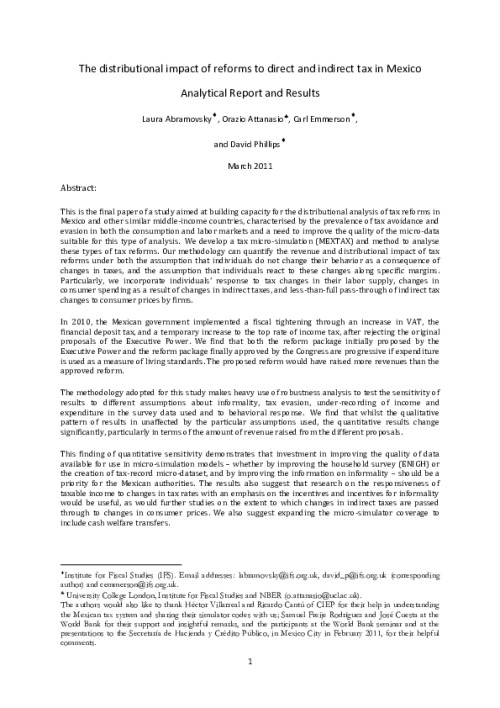Downloads

Mexico_tax.pdf
PDF | 2.35 MB
This is the final paper of a study aimed at building capacity for the distributional analysis of tax reforms in Mexico and other similar middle‐income countries, characterised by the prevalence of tax avoidance and evasion in both the consumption and labor markets and a need to improve the quality of the micro‐data suitable for this type of analysis. We develop a tax micro‐simulation (MEXTAX) and method to analyse these types of tax reforms. Our methodology can quantify the revenue and distributional impact of tax reforms under both the assumption that individuals do not change their behavior as a consequence of changes in taxes, and the assumption that individuals react to these changes along specific margins. Particularly, we incorporate individuals' response to tax changes in their labor supply, changes in consumer spending as a result of changes in indirect taxes, and less‐than‐full pass‐through of indirect tax changes to consumer prices by firms.
Authors

Deputy Director
Carl, a Deputy Director, is an editor of the IFS Green Budget, is expert on the UK pension system and sits on the Social Security Advisory Committee.

Research Fellow
Orazio is an International Research Fellow at the IFS, a Professor at Yale and a Research Associate at the National Bureau of Economic Research.

Research Fellow Institute for Fiscal Studies
Laura is a Research Fellow at IFS. Her current work focuses on tax and social protection policy and programme evaluation in developing countries.

Associate Director
David is Head of Devolved and Local Government Finance. He also works on tax in developing countries as part of our TaxDev centre.
Report details
- Publisher
- World Bank
Suggested citation
Abramovsky, L et al. (2011). The distributional impact of reforms to direct and indirect tax in Mexico: analytical report and results. Washington: World Bank. Available at: https://ifs.org.uk/publications/distributional-impact-reforms-direct-and-indirect-tax-mexico-analytical-report-and (accessed: 30 June 2024).
More from IFS
Understand this issue

Election Special: Your questions answered
27 June 2024

What is the two-child limit in benefits?
27 June 2024

Election Special: The big issues politicians haven't spoken about
25 June 2024
Policy analysis

How would the parties’ tax and spending plans affect Scotland and Wales?
28 June 2024

What are the parties’ plans for benefits and taxes?
24 June 2024

How should we interpret parties’ public spending pledges this election?
23 June 2024
Academic research

The impact of labour demand shocks when occupational labour supplies are heterogeneous
28 June 2024

Targeting men, women or both to reduce child marriage
28 May 2024

Keeping the peace whilst getting your way: Information, persuasion and intimate partner violence
17 May 2024